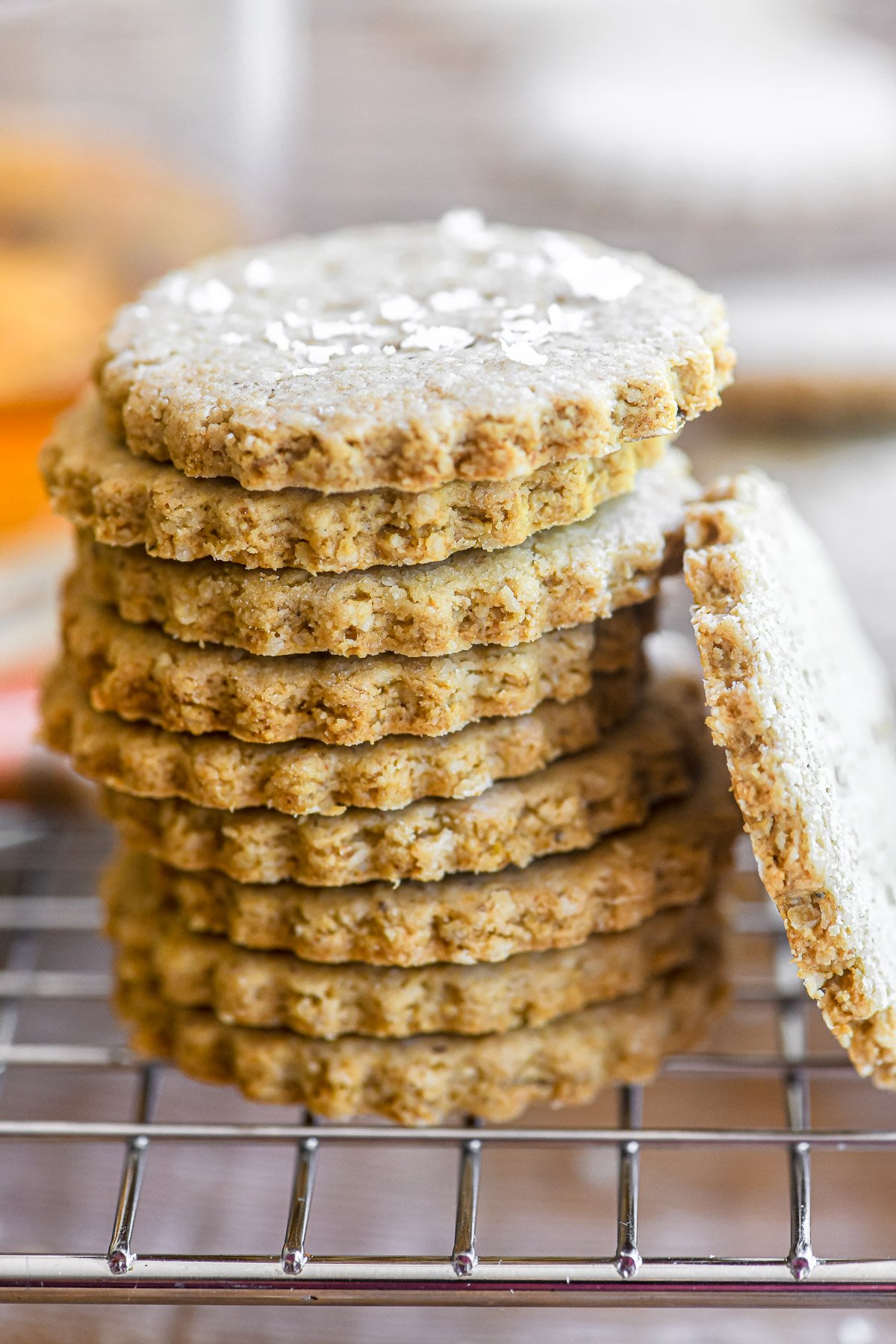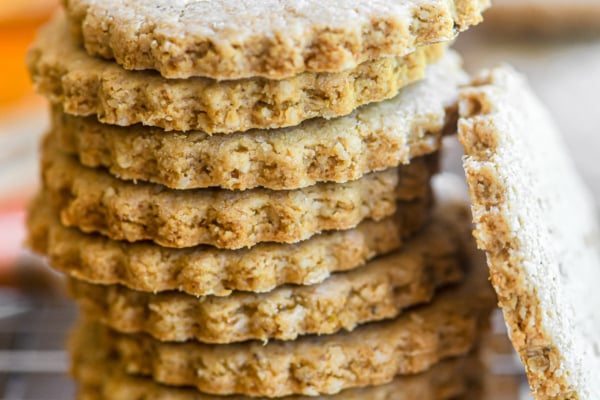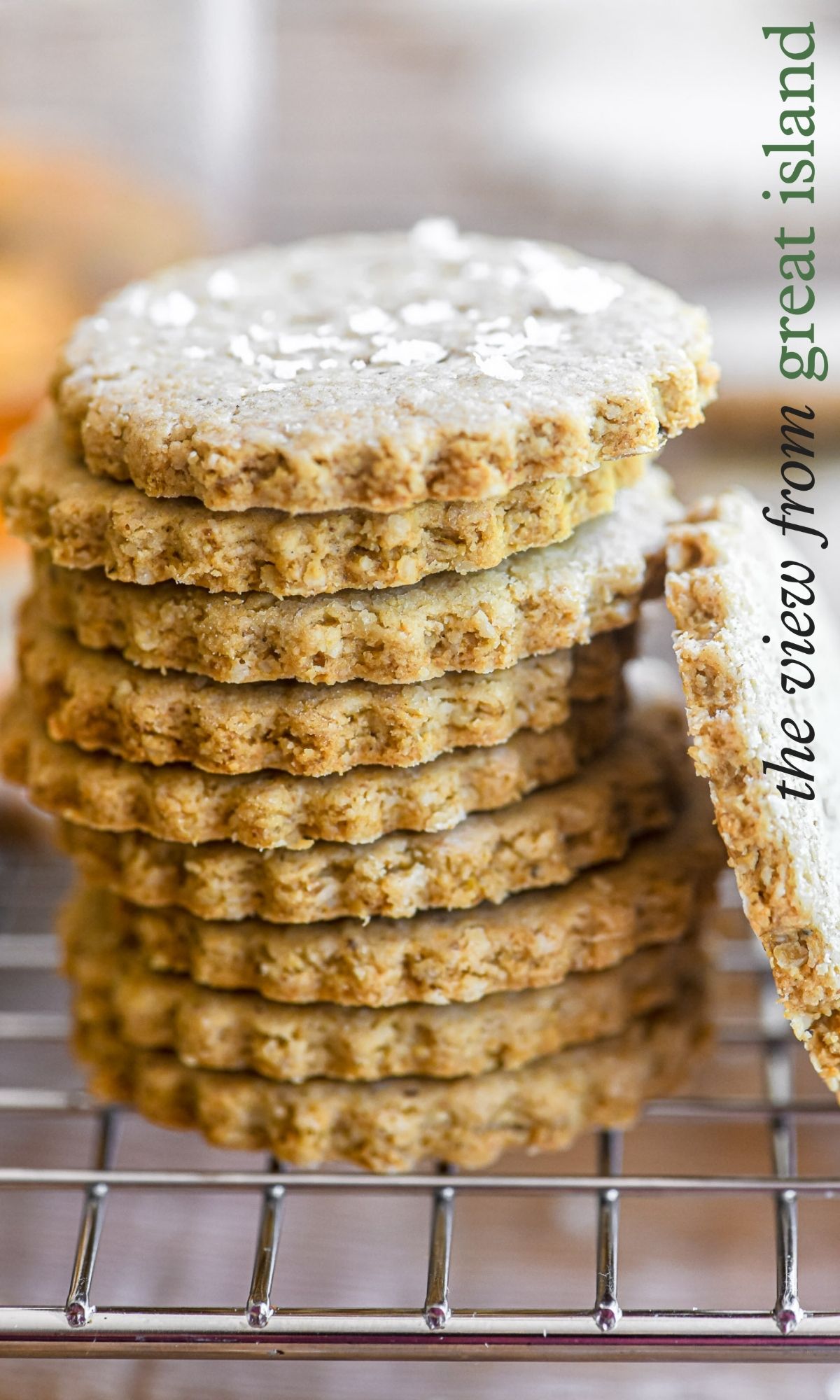Scottish Oatcakes are rustic gluten free crackers perfect for cheese boards and charcuterie platters ~ they’re delicious and so easy to make!

These humble little Scottish oatcakes are having a moment ~ you’ll spot them in all the fancy cheese shops and gourmet markets lately. In Scotland they’re called oatcakes or biscuits, but here in the States, we’d call them a cracker.
They’re a bit different than most crackers you’re used to. Think rustic, nutty, and a little shaggy around the edges. People in the British Isles have been snacking on them for centuries, with tea or alongside cheese and savory toppings. I love them with a sharp English cheddar or a creamy blue and a little drizzle of honey. (They’re also weirdly great with peanut butter.)
Best part? They’re super easy to make. The naturally gluten-free dough is made with oats, oat flour, and walnuts and comes together with soft butter and a splash of buttermilk. A quick bake turns them crisp and golden.


Notes on making Scottish oatcakes
- Be sure to process your walnuts and rolled oats enough ~ they should be finely ground for a smooth cracker.
- The dough should be moist and hold together when pressed between your fingers.
- No need to chill the dough, just roll and bake.
- You can roll these crackers thinner or thicker depending on your preference. Just adjust the baking time.
Why use both oats and oat flour?
- Oats (usually rolled or pinhead/steel-cut) add a rustic, nubby texture and give the oatcakes that classic crumbly bite.
- Oat flour (or finely ground oats) helps bind the dough together and provides a more cohesive, tender texture so the oatcakes don’t fall apart.
Using both creates an oatcake that’s hearty but not too coarse, crisp but not dry ~ basically the best of both worlds.

how I’m serving Scottish oatcakes
Scottish oatcakes are very much a farmhouse staple with deep roots in Scottish history. They date back centuries and were a daily bread substitute for rural Scots. They might not seem like much at first to modern Americans, but their true beauty shines when you pair them up:
- Aged English or Scottish Cheddar
- Stilton or another blue cheese (with a drizzle of honey)
- Creamy Brie or Camembert
- Topped with smoked salmon (I add a layer of cream cheese first)
- With butter and jam or marmalade


Scottish Oatcakes
Equipment
- food processor
Ingredients
- 1 cup old fashioned oats
- 1 cup walnut pieces
- 1 1/2 cups oat flour
- 2 Tbsp brown sugar
- 1 tsp salt
- 1/2 tsp baking soda
- 1/2 cup buttermilk
- 1/4 cup soft or melted butter
Instructions
- Preheat your oven to 350F. Line a baking sheet with parchment paper.
- Put the 1 cup old fashioned oats and the 1 cup walnut pieces in the bowl of a food processor and pulse until finely ground
- Add in the 1 1/2 cups oat flour, 2 Tbsp brown sugar, 1 tsp salt and 1/2 tsp baking soda and pulse to combine.
- Pour in the 1/2 cup buttermilk and 1/4 cup soft or melted butter and pulse until the dough comes together.
- Turn out onto a floured surface and bring the dough together. If it feels wet, knead in a little more flour. If it feels dry add a bit of buttermilk.
- Roll out the dough to about 1/4 inch thick. Cut with a 2-inch cookie cutter. Place the cookies on your parchment lined baking sheet about an inch apart. You can prick the crackers with the tines of a fork if you like the look, but it's not necessary, the dough doesn't rise or puff up.
- Bake for about 15-18 minutes until just starting to turn golden.
- Cool on a rack. Store in an airtight container.




















These crackers are delicious! I found them a little wet to roll out. Rather than adding flour, I put the dough on my silpat mat and covered it with a piece of parchment paper before rolling. Next I cut them into squares with my pizza cutter. After they had baked for 20 minutes I broke them along the score lines and separated them. Then I baked for another 10 minutes and left them in the oven after turning it off to ensure perfect crisping.